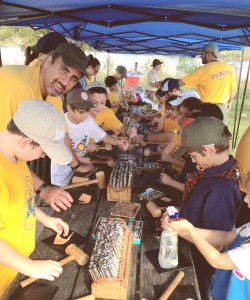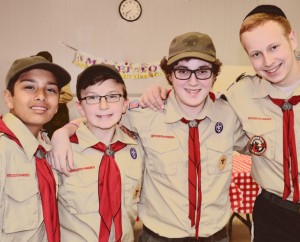
Photo taken at a dinner held in honor of Troop 613 and the scouts’ newly earned ranks, in Keneseth Beth Israel, Richmond, Virginia.
Courtesy of Heni Stein
Think it’s too late for your tech-napped child? Take heart. Hope comes in unexpected forms–sometimes in a khaki uniform.
Orthodox kids across the country are putting aside their Wiis and iPhones to pitch tents, stoke campfires and learn first-aid, CPR and lifelong leadership skills. They’re shomer Shabbat Boy Scouts, and proud of it.
“Parents may not feel comfortable teaching their kids to fish, hike and camp out,” says Alex Hochberger, cubmaster of Pack 18 in Hollywood, Florida. Hochberger treasures the wilderness skills he learned as a child and enjoys teaching them to his twenty-seven cubs. (Kids are Cub Scouts until age ten and Boy Scouts from age eleven to eighteen, whereupon they can become Venture Scouts until age twenty-one.)
“It’s one of the most meaningful experiences of my life,” he says. “I see kids who were scared to try something new working with tools for the first time; these are kids who have never seen a screwdriver.”
Boy Scouts of America encourages participation in projects that contribute to the community, such as helping clean up debris from a natural disaster or collecting surplus food to give to the needy. Kids earn merit badges for accomplishments in sports, the arts, science, business, technology and more.
“My scoutmaster helped mold me into the person that I am today,” wrote an Eagle Scout in his application for admission to Yeshiva University. “He taught me the skills of delegating, listening, problem solving and taking control . . . I was often put in charge of my fellow scouts as troop guide and senior patrol leader. He encouraged me to teach my fellow scouts the basic skills of scouting. There is no better way to know a topic than to teach it to others.”
Howard Spielman, scoutmaster of Troop 54 in Boston, notes the difference between the sense of accomplishment a boy feels in scouting versus playing sports. “In sports, on any given day, it is possible that half the participants go home feeling like losers,” he says. “The scouts are not competing against anyone. When you can chop wood safely, you won. When you can sharpen an axe, you won; when you can cook a meal, you won.”
Sheldon Freidenreich from Highland Park, New Jersey, scoutmaster of Troop 55 for thirty-eight years, illustrates how the scouts develop as mature young men. One boy, who joined the troop at age eleven, struggled with severe Asperger’s syndrome. Although he had poor social skills, he had an uncanny ability to recall every scout skill. He would approach the other scouts, proudly explaining every detail of first-aid procedures he had learned; they responded by feigning disbelief, causing him to feel flustered and hurt.
“With time, the boys learned to be more sensitive,” Freidenreich says. “They learned to work together with [and appreciate] him.”
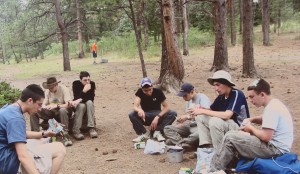
Scouts on a ten-day backpacking trip at the Philmont Scout Ranch in Cimarron, New Mexico.
Courtesy of Daniel Chazin
Preparing Cholent in the Wilderness
The backpacks of shomer Shabbat scouts often include milichig and fleishig pots and utensils, a pair of tefillin and even an occasional sefer Torah for overnight camping trips. “This shows the kids that there there’s no place where you can’t be frum,” says one father of a Boy Scout from the New York area. “There’s an important lesson here–the mitzvot we do [require consistency], and no matter where we are, we take our mitzvot with us. So if you have to take extra water with you on a hike because you have to wash netilat yadayim, that’s what you do.”
Sam Chasan of Bergenfield, New Jersey, a former Boy Scout senior patrol leader and assistant scoutmaster, concurs. “Every morning you’re davening with a minyan as the sun is rising against a beautiful setting,” says Chasan, who was himself a Boy Scout back in the 1980s. “It’s not only an outdoor experience; it’s a meaningful Jewish experience.” Once a scout, always a scout; scout leaders still call on Chasan to cook for Boy Scout events.
Camping over Shabbat requires familiarity in both halachah and outdoor culinary techniques. Frum scouts learn how to construct a kosher eruv, determine the campsite techum (distance one can travel on Shabbat) and prepare cholent for the troop that will remain hot for the day seudah.
“We start a campfire before Shabbat, and once it begins to burn down, we bury a cast-iron Dutch oven filled with the cholent materials in the hot coals; the coals stay warm for at least thirty hours,” explains Saul Zebovitz, an Eagle Scout and former assistant scoutmaster of Troop 185 in Elkins Park, Philadelphia, the troop in which he participated as a boy. “Come Shabbat day, it’s fully cooked and we have a delicious cholent. We also make fantastic apple crisp that way.”
Yehuda Katz, an Eagle Scout who has held a number of leadership roles in the Boy Scouts, including assistant scoutmaster of Troop 613 in Silver Spring, Maryland and Troop 54 in Har Nof, Yerushalayim, says that there are many halachot that he never would have learned if not for the program.
“As a youth leader in the troop, I called in the head of our local eruv to talk to us about the details involved in building an eruv,” he says. “You have to know what is not allowed to be inside an eruv, like a swamp or any body of water that is not drinkable.”
Frum scouts learn how to construct a kosher eruv, determine the campsite techum (distance one can travel on Shabbat) and prepare cholent for the troop that will remain hot for the day seudah.
Why would an Orthodox kid want to become a Boy Scout? “The boys get leadership experience that they are not going to get elsewhere,” says Daniel Chazin, a retired lawyer who is the scoutmaster of Troop 226 in Teaneck, New Jersey. “They plan and run the meetings and activities; they come up with and follow through on their own ideas.” Priming the next generation of leaders, Chazin, who has published several books on hiking and has been involved in scouting since 1977, currently directs scouts whose fathers were in his troop. “It’s wonderful to know I had an impact on their lives.”
Along with learning essential life skills, including emergency preparedness and how to survive in the great outdoors, scouting emphasizes spirituality. In fact, one of the Scout Laws obligates scouts “to be reverent” (without specifying any particular faith).
“Belief in God and religion is an integral part of scouting,” says the father of a shomer Shabbat Boy Scout. “It’s respected, expected and accommodated. Religion permeates the entire scouting experience.”
Middot are stressed as well. “Boy Scouts hold dear many ‘old-fashioned’ values that are not so cool in the world today, among them honesty, integrity and respect–middot that we [as frum Jews] value,” says Naomi Stillman, DDS, from Brookline, Massachusetts, the parent of an Eagle Scout. “The program also inculcates the idea of cheerfulness and helping others. My son Avinoam [now twenty-one], who started scouting at ten years old, became very self-reliant; at the same time, he’s alert [to the needs of others] and always available to help.” Her son comes from a long-standing Boy Scout tradition. His father and paternal grandfather both participated in a shomer Shabbat troop in Borough Park, Brooklyn.
“I love camping with them; I adore the simplicity of it,” Stillman says. “There are no phone calls, e-mails, racing around; no modern frenetic daily life. The Scouts manage the cooking; I don’t have to lift a finger. It’s a great getaway.”
Every four years, troops from across the country, approximately 40,000 scouts, gather at The Summit Bechtel Family National Scout Reserve in West Virginia, which is 10,600 acres of forest, surrounded by over 70,000 acres of National Park Service land, for a jamboree–a ten-day celebration of scouting that includes white-water canoeing, rock climbing, mountain biking, zip lining and more. Among the participants is a strong contingent of shomer Shabbat troops.
Birth of a Jewish Boy Scout Troop
According to the National Jewish Committee on Scouting (NJCOS), the first exclusively Jewish Boy Scout troop was formed in 1913, at the 92nd Street Y in Manhattan; by 1957, 1,367 troops were chartered to Jewish religious institutions throughout the United States, with an estimated 100,000 Jewish scouts registered in both Jewish and non-Jewish sponsored scout troops. Based on conversations with national leaders of the Boy Scouts of America and local Jewish scout leaders across the nation, Spielman reports that there are approximately sixty Jewish Cub Scout packs and seventy Jewish Boy Scout troops. Of the 130 combined Jewish packs and troops, approximately 40 percent are shomer Shabbat, totaling 840 boys.
Spielman, who has a PhD in administration and computer graphics, began his sixty-year-long involvement in shomer Shabbat scouting in the early 1950s as an eight-year-old Cub Scout.
His father launched Pack 100 in 1954, chartered to the Orthodox synagogue Congregation Shaaray Tefila, then in Far Rockaway, New York (now in Lawrence). That pack grew quickly to seventy boys, and was one of the most active shomer Shabbat packs, according to Spielman. Spielman remembers having adult leaders who had been scouts in shomer Shabbat troops in the 1920s. The number of shomer Shabbat Boy Scouts hit a peak after World War II, with a significant number of Orthodox synagogues in the New York area chartering troops. “There may very well have been about 4,000 shomer Shabbat Boy Scouts in New York City in 1960,” says Spielman. “The world was different then. You didn’t have as much competition from computer games.”
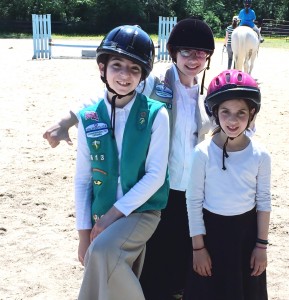
Girls in Girl Scout Troop 613 getting ready to go horseback riding at Foxmeade Farms in Midlothian, Virginia. Courtesy of Heni Stein
Making an Impression
Shomer Shabbat Boy Scouts also get a summer camp experience at the Forestburg Scout Reservation near Monticello, New York. “We created an infrastructure for our troops,” says Spielman, referring to a shul, a separate (kosher) half of the dining hall, as well as their own freezer, oven and preparation area. Scoutmaster and Eagle Scout Yehuda Katz recalls the summer Rabbi Yisroel Belsky, one of the senior halachic consultants for OU Kosher, came to the camp to teach the boys about the wonders of astronomy.
Scouting events and campouts afford the shomer Shabbat scouts many opportunities to make a kiddush Hashem. “If we share camping areas with non-Jewish troops, they watch us daven and see how involved we are in it,” Katz says. “They notice that there are kids who are leading the service; that really impresses them. They’ve told us that outright.”
Wanting to get in on all the fun, the younger sister of a scout in Troop 613 in Richmond, Virginia, approached Russ Stein, scoutmaster of the troop, wanting to become a scout. Stein’s wife, Heni, who didn’t see herself as an outdoorsy type, reluctantly agreed to lead an Orthodox all-girls troop.
She loves it.
Her troop, numbering eighteen girls, focuses on chesed. They’ve written letters to the marines in Afghanistan, worked with homeless veterans and planted a vegetable garden for a local nursing home.
“Because we have no kids [of our own], this is our way of giving to the next generation,” Russ Stein says. “The girls love Heni; on Shabbat at our shul, they flock to her.”
The diverse observance levels within the shomer Shabbat troops also present outreach opportunities. Spielman relates that a number of years back, he was asked to speak at the Jewish Federation’s General Assembly. Addressing Jewish educators from around the country, he led a session focusing on possible strategies to keep teenagers involved in Jewish activities.
“At that time, my troop was chartered through a Jewish community center, so I had a heterogeneous population,” Spielman says. (His troop is currently chartered through the Maimonides School in Boston.) He brought along a boy from a Reform background and one from a Conservative background. He explained what the scouts do, and showed photos of them canoeing and horseback riding in the Rocky Mountains. He then let the boys speak to the group, having little idea what they would say.
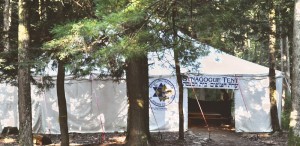
Shul tent in the Forestburg Scout Reservation near Monticello, where shomer Shabbat Boy Scouts get a summer camp experience. Courtesy of Howard Spielman
“They both told the group that they learned more about Judaism in the Boy Scouts than in all of their years in Hebrew school,” Spielman says. Some unaffiliated boys even went on to get semichah. “One mother told me her son would not be shomer Shabbat today if it weren’t for the Boy Scouts.”
For all its character building and fun, shomer Shabbat scouting could very well be one of the Jewish world’s best-kept secrets. Steve Kahn, scoutmaster of Troop 613 in West Hempstead, New York, says that since the older boys leave the troop at eighteen, he’s always looking to bring in new youngsters. “It’s a challenge getting the word out,” he says.
“The population ebbs and flows as new troops are formed and older ones expire,” reports Spielman. Nonetheless, he’s optimistic. “The number of shomer Shabbat troops could easily grow. All it takes to start one is five boys, three adults and a charter organization. The adults require no special skills; the Boy Scouts of America will give them all the training they need, as well as experienced scouting volunteers to help them get their program up and running.”
Spielman’s enthusiasm for the Boy Scouts extends to his entire family. Once when his mother, who was in her nineties, became ill and was wheeled out of her home on a stretcher, he leaned over and asked her how she was feeling. She answered: “Get me more of those brochures about Boy Scouts. One of the Hatzalah guys [here] has a kid who’s the right age.”
Bayla Sheva Brenner is senior writer in the OU Communications and Marketing Department.
Listen to Howard Spielman discuss shomer Shabbat Boy Scouting at www.ou.org/life/community/savitsky-spielman/.
To start your own troop or to learn more about kosher scouting, contact Friends of Shomer Shabbat Scouting at 443-288-6278.
